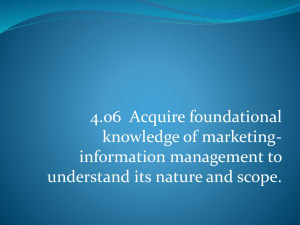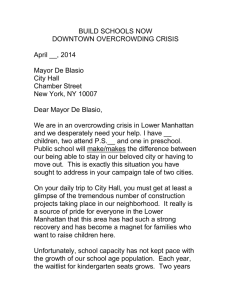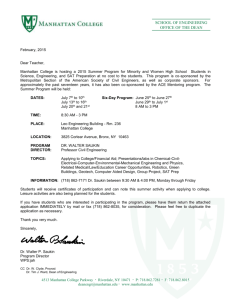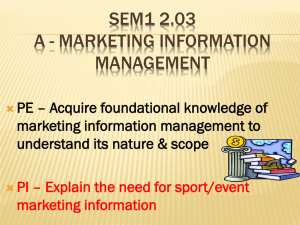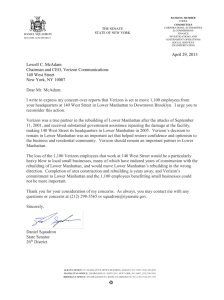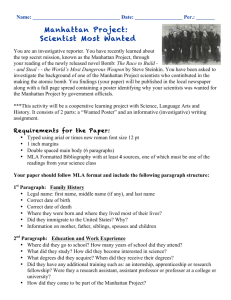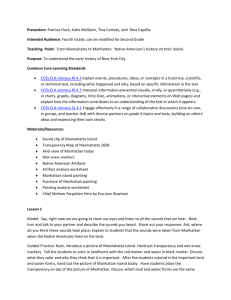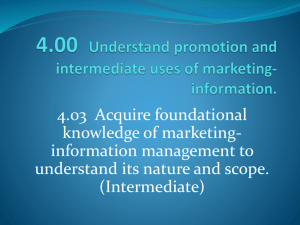Dear Ms
advertisement
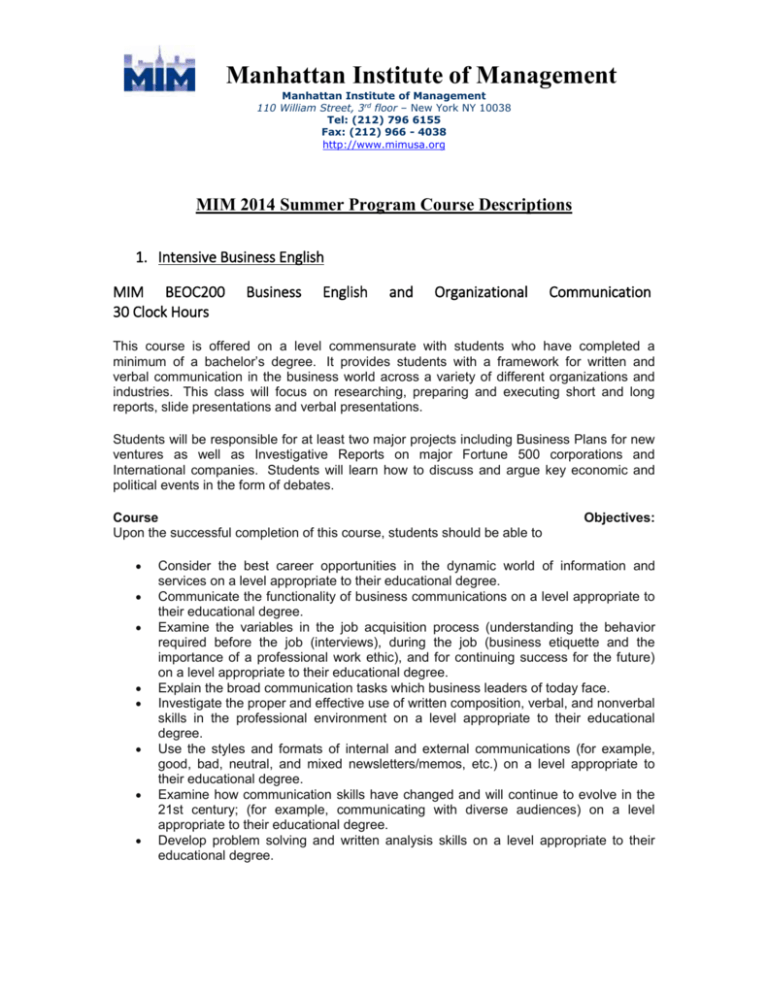
Manhattan Institute of Management Manhattan Institute of Management 110 William Street, 3rd floor – New York NY 10038 Tel: (212) 796 6155 Fax: (212) 966 - 4038 http://www.mimusa.org MIM 2014 Summer Program Course Descriptions 1. Intensive Business English MIM BEOC200 30 Clock Hours Business English and Organizational Communication This course is offered on a level commensurate with students who have completed a minimum of a bachelor’s degree. It provides students with a framework for written and verbal communication in the business world across a variety of different organizations and industries. This class will focus on researching, preparing and executing short and long reports, slide presentations and verbal presentations. Students will be responsible for at least two major projects including Business Plans for new ventures as well as Investigative Reports on major Fortune 500 corporations and International companies. Students will learn how to discuss and argue key economic and political events in the form of debates. Course Upon the successful completion of this course, students should be able to Objectives: Consider the best career opportunities in the dynamic world of information and services on a level appropriate to their educational degree. Communicate the functionality of business communications on a level appropriate to their educational degree. Examine the variables in the job acquisition process (understanding the behavior required before the job (interviews), during the job (business etiquette and the importance of a professional work ethic), and for continuing success for the future) on a level appropriate to their educational degree. Explain the broad communication tasks which business leaders of today face. Investigate the proper and effective use of written composition, verbal, and nonverbal skills in the professional environment on a level appropriate to their educational degree. Use the styles and formats of internal and external communications (for example, good, bad, neutral, and mixed newsletters/memos, etc.) on a level appropriate to their educational degree. Examine how communication skills have changed and will continue to evolve in the 21st century; (for example, communicating with diverse audiences) on a level appropriate to their educational degree. Develop problem solving and written analysis skills on a level appropriate to their educational degree. Manhattan Institute of Management Manhattan Institute of Management 110 William Street, 3rd floor – New York NY 10038 Tel: (212) 796 6155 Fax: (212) 966 - 4038 http://www.mimusa.org 2. International Marketing MIM MKT300 30 Clock Hours International Marketing This program lays out the competitive orientation and strategies for initial entry, market expansion, and integration of global marketing operations. There is a heavy emphasis on the development of skills in analyzing and formulating international marketing initiatives and appreciation for the complexities of the global marketing through readings, case studies, and web site and media articles. The course includes lectures, readings, online research, case studies, presentations, and group projects. Course Upon the successful completion of this course, students should be able to Objectives Describe the export/import business management on a level appropriate to their educational degree. Discuss the process of globalization and the implications of globalization for business firms and their managers on a level appropriate to their educational degree. Compare and contrast how and why the world’s countries differ on a level appropriate to their educational degree. Present a review of the economies and policies of global trade and investment on a level appropriate to their educational degree. Examine the different strategies that businesses can adopt to compete in the global marketplace and enter specific foreign markets on a level appropriate to their educational degree Explore the role played by marketing, operations, and human resource management within an international business on a level appropriate to their educational degree. 3.International Trade and Business MIM IBUS100 30 Clock Hours International Trade and Business This course explores the nature, scope, and challenges of managing a global business. It examines the international business environment – the rationale for growing international business, the influence of various cultural experiences, and the international monetary systems. Special emphasis will be placed on the various topics related to international Manhattan Institute of Management Manhattan Institute of Management 110 William Street, 3rd floor – New York NY 10038 Tel: (212) 796 6155 Fax: (212) 966 - 4038 http://www.mimusa.org business management - global supply chain, international human resource and financial management. Course Upon the successful completion of this course, students should be able to Objectives Identify and explain current business trends and how to cultivate a business in a diverse, global environment. Understand how businesses are able to open new markets and compete effectively in a challenging, global business environment. Understand foreign exchange markets. Understand the various concepts of supply chain management. Explain management of human resources in a global context. Understand international financial management and accounting. Understand the global forces driving international competitiveness. 4. Social Media ManagementSocial media are changing the way we do business and how leaders are perceived, from the shop floor to the CEO suite. But whereas the best businesses are creating comprehensive strategies in this area, research suggests that few corporate leaders have a social media presence--say, a Facebook or LinkedIn page--and that those who do don't use it strategically. We are going about the way we measure the return on investment in social media completely backwards. Effective social media measurement should start by turning the traditional ROI approach on its head. That is, instead of emphasizing their own marketing investments and calculating the returns in terms of customer response, managers should begin by considering consumer motivations to use social media and then measure the social media investments customers make as they engage with the marketers' brands. Marketers still place high value on social media: A significant 83% of marketers indicate that social media is important for their business. Course objectives (Key Benefits) Assess Social Media strategies and applications for local business, including online marketing, search engines optimization Differentiate electronic marketplaces and give examples of social media products and services Categorize advantages and disadvantages of different social media strategies

